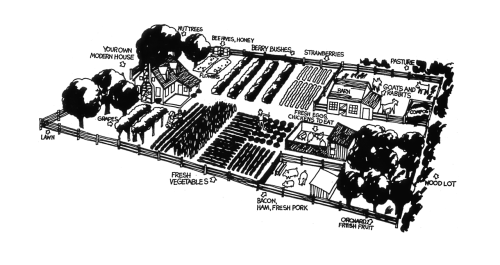A Massive Spinning Ring Could Store Our Excess Energy
A massive spinning ring could store our excess energy
More Posts from Copperfingertips and Others


Meet the Women Behind California’s First Open-Water Seaweed Farm
They’re on a quest for a delicious solution to global food insecurity
Tessa Emmer, Catherine O’Hare, and Avery Resor constitute the all-female braintrust behind Salt Point Seaweed, a fledgling Bay Area company that launched last June. They’ve been harvesting wild seaweed off the coast of Mendocino County, located a few hours north of San Francisco, for two years and selling it to chefs at local restaurants, seafood CSAs, and at retail. Now, they’re striving to become the first West Coast seaweed farming operation to establish an active, open-water farm.
The idea to launch a sustainable seaweed syndicate came to Emmer, O’Hare, and Resor after living in East Africa and witnessing the burgeoning role of seaweed in those communities—as local fishing stock dwindled, resourceful women had found a reliable replacement in seaweed. Seaweed grows rapidly and easily without help from external inputs. Emmer and Resor, who share a background in natural resource management, drew inspiration from a hardscrabble female aquafarming operation in Zanzibar. “There were so many women farmers using it as an alternative revenue model in declining fisheries environments,” says Emmer. “We started wondering why it wasn’t happening in California.”
(via Meet the Women Behind California’s First Open-Water Seaweed Farm | Sierra Club)

Salt Point Seaweed is a three-woman team - Tessa Emmer, Catherine O'Hare, and Avery Resor - living in the Bay Area and working throughout California.
Tessa and Catherine met as undergraduates at Oberlin College and have spent many days exploring the Pacific Ocean from Oahu, Hawaii, to Mendocino, California. Tessa fell in love with the coastal and riparian ecosystems of the Pacific coast when she came out to California for a restoration internship with the Presidio of San Francisco. Her drive to work at the intersection of ecological conservation, economic development, and climate adaptation led her to pursue a master in sustainable development at UC Berkeley, where she met Avery.
Catherine has a background in coastal ecology and sustainable agriculture. She grew up next to the ocean, splashing around the sunny tide pools of southern California. After graduating with a Biology degree from Oberlin College, she worked for small scale organic farms and a small food business, solidifying her passion for local food, regenerative food systems, and health.
Avery grew up living and working on a cattle ranch and has been working in sustainable agriculture ever since. At Duke University Marine Lab, she studied marine biology and environmental science and was captivated by the parallels between aquaculture and land-based agriculture. She is integrating her agriculture experience with 10 years of professional cooking experience to bring farm-to-table culinary expertise to our team.
Avery, Catherine, and Tessa are all committed to using business as a force for environmental protection, community development, and food system transformation.
https://www.saltpointseaweed.com/about
You can find out more / follow them on instagram here: https://www.instagram.com/saltpointseaweed/

Floating A-frame, submitted by Martino


Clean energy technologies threaten to overwhelm the grid. Here’s how it can adapt.
The centralized, top-down power grid is outdated. Time for a bottom-up redesign.
The US power grid is, by some estimates, the largest machine in the world, a continent-spanning wonder of the modern age. And despite its occasional well-publicized failures, it is remarkably reliable, delivering energy to almost every American, almost every second of every day.
This is an especially remarkable accomplishment given that, until very recently, almost none of that power could be stored. It all has to be generated, sent over miles of wires, and delivered to end users at the exact second they need it, in a perfectly synchronized dance.
Given the millions of Americans, their billions of electrical devices, and the thousands of miles of electrical wires involved, well, it’s downright amazing.
Still, as you may have heard, the grid is stressed out. Blackouts due to extreme weather (hurricanes, floods, wildfires) are on the rise, in part due to climate change, which is only going to get worse. The need for local resilience in the face of climate chaos is growing all the time.
Unless old systems are reconceived and redesigned, they could end up slowing down, and increasing the cost of, the transition to clean electricity (and hampering the fight against climate change).
(via Renewable energy threatens to overwhelm the grid. Here’s how it can adapt. - Vox)

Picked up this Hoya Bella recently, and it really compliments the window space ❤️

Germany had so much renewable energy on May 8, 2016, that it had to pay citizens to use electricity. It was so windy and sunny that turbines and solar power sources were supercharged, output exceeded demand, and prices went negative, so customers were actually paid to consume energy. Source
How anarchist organizers in rural Puerto Rico rebooted their power grid after the privatized power company abandoned them

After being hammered by hurricane Maria, the residents of the rural Puerto Rican mountain town of Mariana got tired of waiting for the bumbling, privatized, cash-starved power authority to reconnect them to the grid, so the anarchist organizer Christine Nieves founded Proyecto de Apoyo Mutuo, one of a dozen-odd cooperatives across the island to create their own solar grid; by the time the The Puerto Rico Electric Power Authority finally put in appearance, Mariana had had power for two whole months.
After Maria, Puerto Rico suffered the second-longest blackout in world history, ignored by both the federal government and the gutted, heavily privatized local government. So community organizers like Nieves took matters into their own hands.
Nieves’s group formed an alliance with the Katrina-inspired Mutual Aid Disaster Relief, which fundraised to send gear to Puerto Rico.
The island-wide efforts are rare bright spots in a year-long crisis with no end in sight. Naturally, they’ve faced police harassment and raids looking for “antifa.”
https://boingboing.net/2018/09/13/better-than-bounty.html
If You’re Gonna Make Something Wheelchair Accessible, Don’t Make it a Thing
Here’s some examples awkward accessibility being a thing:
Your at a hotel that has a lift to get you from one sub-floor to another, but the lift can only be unlocked and operated by one specific person that the hotel now has to go find. Sure, they’ve made the entrance to the sub-floor is accessible, but now it’s a thing.
The buses are wheelchair accessible but the driver has to stop the bus, take 30 seconds to lower the goddamn ramp, move passengers out of their seats, hook up the straps and then secure you in the bus. Sure, they’ve made the busses accessible but now it’s a thing.
The restaurant has an accessible entrance, but it’s past the trash room and through the kitchen. Sure, the restaurant is accessible, but now it’s an insulting thing.
Here’s some great examples of accessibility not being a thing:
The train to the airport pulls up flush with the platform. I board with everyone else and sit wherever the fuck I want. Riding the train is accessible and not a thing.
In Portland, I press a button the side of the streetcar and a ramp automatically extends at the same time the door opens. I board in the same amount of time as everyone else. This is not a thing.
I get that it is difficult to design for wheelchair accessibility, but folks need to start considering the overall quality of the experience versus just thinking about meeting the minimum requirements.
“my favorite thing about you is your smell
you smell like
earth
herbs
gardens
a little more
human than the rest of us”
- rupi kaur, milk and honey
-
 but-the-earth-refused reblogged this · 6 years ago
but-the-earth-refused reblogged this · 6 years ago -
 garfield-baybee liked this · 6 years ago
garfield-baybee liked this · 6 years ago -
 mileysyrups liked this · 6 years ago
mileysyrups liked this · 6 years ago -
 neeeeerrrrrd liked this · 6 years ago
neeeeerrrrrd liked this · 6 years ago -
 thatmadscientistbitch reblogged this · 6 years ago
thatmadscientistbitch reblogged this · 6 years ago -
 no-words-for-iu liked this · 6 years ago
no-words-for-iu liked this · 6 years ago -
 demonizer0 liked this · 6 years ago
demonizer0 liked this · 6 years ago -
 witchpunkboy reblogged this · 6 years ago
witchpunkboy reblogged this · 6 years ago -
 unnoticed-thinker liked this · 6 years ago
unnoticed-thinker liked this · 6 years ago -
 therealrebehm liked this · 6 years ago
therealrebehm liked this · 6 years ago -
 jle321456 liked this · 6 years ago
jle321456 liked this · 6 years ago -
 mountainbeacon liked this · 6 years ago
mountainbeacon liked this · 6 years ago -
 jaybarou reblogged this · 6 years ago
jaybarou reblogged this · 6 years ago -
 miscojones33 reblogged this · 6 years ago
miscojones33 reblogged this · 6 years ago -
 sciencenerd4-blog liked this · 6 years ago
sciencenerd4-blog liked this · 6 years ago -
 joe-a-nevem liked this · 6 years ago
joe-a-nevem liked this · 6 years ago -
 a-goat-chariot-rider liked this · 6 years ago
a-goat-chariot-rider liked this · 6 years ago -
 tycoon88 liked this · 6 years ago
tycoon88 liked this · 6 years ago -
 gyrosummers liked this · 6 years ago
gyrosummers liked this · 6 years ago -
 cybernetictemporalautomotom liked this · 6 years ago
cybernetictemporalautomotom liked this · 6 years ago -
 cybernetictemporalautomotom reblogged this · 6 years ago
cybernetictemporalautomotom reblogged this · 6 years ago -
 materialpenguin liked this · 6 years ago
materialpenguin liked this · 6 years ago -
 mrdoctorprofessorman-blog liked this · 6 years ago
mrdoctorprofessorman-blog liked this · 6 years ago -
 alittleworldlywise liked this · 6 years ago
alittleworldlywise liked this · 6 years ago -
 bumblegump liked this · 6 years ago
bumblegump liked this · 6 years ago -
 arabbitonthemoon liked this · 6 years ago
arabbitonthemoon liked this · 6 years ago -
 azuregod reblogged this · 6 years ago
azuregod reblogged this · 6 years ago -
 materialsscienceandengineering reblogged this · 6 years ago
materialsscienceandengineering reblogged this · 6 years ago -
 minebutluminous liked this · 6 years ago
minebutluminous liked this · 6 years ago -
 a-charaid liked this · 6 years ago
a-charaid liked this · 6 years ago -
 tragicallybeautifultiger liked this · 6 years ago
tragicallybeautifultiger liked this · 6 years ago -
 salahare liked this · 6 years ago
salahare liked this · 6 years ago -
 thodust liked this · 6 years ago
thodust liked this · 6 years ago -
 iothefool reblogged this · 6 years ago
iothefool reblogged this · 6 years ago -
 bumblebeeappletree reblogged this · 6 years ago
bumblebeeappletree reblogged this · 6 years ago -
 bumblebeeappletree liked this · 6 years ago
bumblebeeappletree liked this · 6 years ago -
 copperfingertips reblogged this · 6 years ago
copperfingertips reblogged this · 6 years ago -
 solar-punk-future reblogged this · 6 years ago
solar-punk-future reblogged this · 6 years ago -
 solarpunk-gnome reblogged this · 6 years ago
solarpunk-gnome reblogged this · 6 years ago
